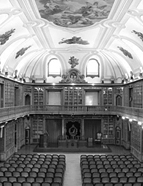

In general, and for the full eight volume set of Memórias de Literatura Portuguesa, historical themes clearly dominate, including studies on civil, ecclesiastical and military history, the history of language and literature, and the history of the judiciary, law and legislation. The publication of various monographic and sectorial notes with incursions in the fields of social, economic and institutional history are also worthy of note. Many of the published memoirs were texts submitted to competitions launched by the ACL itself, with a view to awarding and acknowledging the merit of approaches to subjects deemed essential by the ACL's management for the creation of broad knowledge in the various areas of its intervention (natural sciences, exact sciences and literature, the latter subdivided into language and history). Among the themes put out for tender, which were awarded and published, subjects of a historical nature were a regular feature, namely related to the evolution of primogeniture law, the introduction of canon law and Roman law in Portugal, numismatics and the history of coins, the history of weights and measures from the foundation of the monarchy, the evolution of the population from the time of the discoveries, the history of diseases, etc.
In addition to the Memórias de Literatura Portuguesa collection, the ACL also published its own works by authors deemed outstanding for the quality and relevance of their historical research, especially with regard to sources and indexes within the scope of legislation and law, in their different areas of application. The works of Pascoal de Melo Freire, José Anastácio de Figueiredo and João Pedro Ribeiro are particularly noteworthy, due to the lasting influence they would come to exert.
A concern may be noted among many of the authors who collaborated in the historiographical production of the ACL to justify the need for a new understanding of the historical object and a new approach on the part of the subject interpreting the facts proven by archival documentation. Taking as an example João Pedro Ribeiro, one of the leading figures of this enlightened generation of ACL historians, it is possible to note the pains he takes in the prologue to the first volume of the Dissertações Cronológicas e Críticas [Chronological and Critical Dissertations](1810) to justify the publication of his work with the need to restore truth to the fabricated false documents or the misrepresented and misinterpreted historical facts. Thus, we are presented with a process of publication and interpretation of sources which is driven by a motivation of heuristic and hermeneutic reconstruction, in which the texts, and the narrative constructed thereof, are framed by the goal of constituting a memory which had either been abandoned or had undergone undue appropriation.
